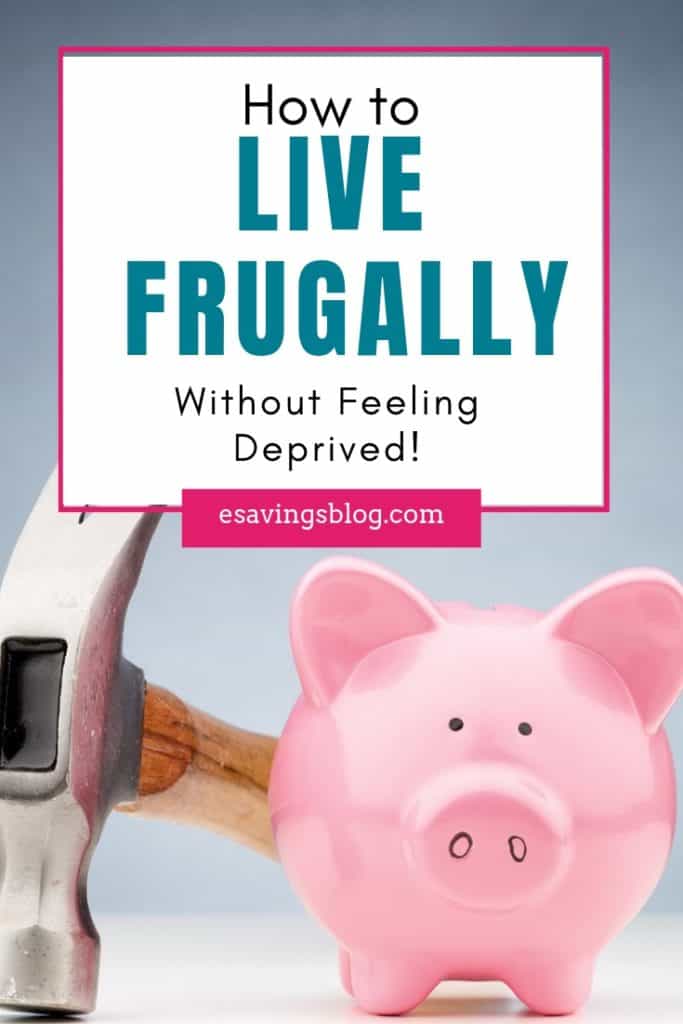In this article, I will be discussing 10 tips for living frugally without feeling deprived. Living a frugal lifestyle doesn’t mean sacrificing everything you enjoy. Throughout this article, you will learn practical ways to cut expenses, save money, and still indulge in the things that bring you happiness. By implementing these tips, you can live a more financially conscious and fulfilling life, without feeling like you’re missing out.

Understanding a Frugal Lifestyle
Living frugally means making deliberate choices to spend money wisely and prioritize savings. It is about finding ways to stretch your hard-earned dollar without feeling deprived or sacrificing your quality of life. A frugal lifestyle is not about being cheap or stingy; it is about being mindful of your spending and making conscious decisions about where your money goes.
Benefits of adopting a frugal lifestyle
Embracing a frugal lifestyle has numerous benefits that go beyond just saving money. Here are a few reasons why living frugally can be advantageous:
-
Financial security: By living within your means and saving money, you can build a significant emergency fund and have peace of mind knowing that you are financially prepared for unexpected expenses.
-
Debt reduction: A frugal lifestyle can help you pay off debt faster by cutting unnecessary expenses and directing more money towards debt repayment.
-
Achieving financial goals: Living frugally allows you to save for long-term goals such as homeownership, retirement, or education without relying heavily on loans or credit.
-
Reduced stress: Financial stress can take a toll on your mental and emotional well-being. Living frugally helps alleviate this stress and allows you to focus on what truly matters in life.
-
Environmental impact: Often, living frugally involves adopting sustainable practices, such as reducing waste, reusing items, and consuming less. By doing so, you contribute positively to the environment.
Setting Financial Goals
Setting financial goals is an essential aspect of living frugally. Without clear goals, it can be challenging to stay motivated and track your progress. Here’s why setting financial goals is crucial:
-
Focus and direction: Having specific financial goals gives you something to work towards. It helps you stay focused and motivated, especially when the journey towards frugality becomes challenging.
-
Prioritization: Financial goals help you prioritize your spending and avoid impulse purchases. By understanding what you want to achieve with your money, you can make more intentional choices about where it should be allocated.
-
Measurement: Setting goals allows you to track your progress and evaluate your financial health. It gives you a benchmark against which you can measure your success and make adjustments if necessary.
To identify your financial goals, start by asking yourself what you want to achieve in the short-term and long-term. Do you want to pay off debt, save for a down payment on a house, or retire early? Write down your goals and make them as specific and measurable as possible.
Creating a Budget
One of the most crucial aspects of living frugally is creating and sticking to a budget. A budget acts as a financial roadmap, providing guidance on how and where your money should be allocated. Here’s why budgeting is important:
-
Awareness: Creating a budget allows you to be fully aware of where your money is going. It highlights areas where you may be overspending and helps you make informed decisions about where to cut back.
-
Control: A budget gives you control over your finances. It ensures that your income is allocated appropriately towards your needs, wants, and savings, preventing you from overspending or living paycheck to paycheck.
-
Planning: A budget helps you plan for future expenses and financial goals. It allows you to anticipate upcoming expenses and save accordingly, reducing the likelihood of having to rely on credit cards or loans.
To create an effective budget, start by tracking your income and expenses for at least one month. Categorize your expenses into fixed (e.g., rent, utilities) and variable (e.g., groceries, entertainment). Determine how much you want to allocate towards each category, ensuring that you prioritize savings. Use budgeting apps or spreadsheets to help you track your progress and make adjustments as needed.
Track Your Expenses
Tracking your expenses goes hand in hand with creating a budget. It involves diligently recording every single purchase you make, no matter how small. Here’s why tracking your expenses is essential:
-
Awareness and accountability: Tracking your expenses helps you become aware of your spending habits and holds you accountable for your financial choices. It allows you to identify areas where you may be overspending and adjust your behavior accordingly.
-
Identifying patterns: By tracking your expenses, you can identify patterns in your spending. You may discover that you spend a significant amount on dining out or impulse purchases, giving you the opportunity to address these habits and make necessary changes.
-
Adjusting your budget: Tracking your expenses enables you to make more accurate and informed adjustments to your budget. It allows you to see if you are sticking to your spending targets and make necessary modifications to stay on track.
There are various tools available to help you track your expenses, from budgeting apps to spreadsheets. Find a system that works for you and make it a habit to record your expenses regularly. This practice will give you a clearer picture of your financial situation and make it easier to make adjustments and achieve your frugal living goals.

Reducing Monthly Bills
Reducing monthly bills is an effective way to live more frugally and save money in the long run. By finding ways to cut down on expenses, you can free up more money to put towards savings or other financial goals. Here are some tips for reducing your monthly bills:
-
Cutting down utility bills: Save energy and money by turning off lights and appliances when not in use, adjusting your thermostat to conserve energy, and using natural light whenever possible. Consider installing energy-efficient light bulbs and appliances to further reduce your utility bills.
-
Lowering insurance costs: Shop around for insurance policies and compare quotes from different providers. You might find that you can get the same coverage for a lower price. Additionally, consider bundling your insurance policies (e.g., home and auto) with one provider to potentially save on premiums.
-
Negotiating service providers: Call your cable, internet, or phone service providers to negotiate a lower rate. Often, they are willing to offer promotions or discounts to retain your business. If they are not willing to negotiate, consider switching to a different provider that offers a better deal.
By implementing these tips, you can significantly reduce your monthly bills and have more money to allocate towards your savings or other financial goals.
Smart Grocery Shopping
Groceries are a significant expense for most households, but there are ways to save money while still enjoying healthy and delicious meals. Here are some tips for smart grocery shopping:
-
Meal planning and buying in bulk: Plan your meals for the week ahead, create a grocery list based on those meals, and stick to it. By doing so, you can avoid impulse purchases and waste. Buying non-perishable items in bulk can also save you money in the long run.
-
Using coupons and shopping sales: Take advantage of coupons, discounts, and sales to save money on groceries. Look for coupons online, in newspapers, or sign up for loyalty programs at your favorite grocery stores. Additionally, consider purchasing generic or store-branded products, which are often cheaper than name brands.
-
Shopping at local farmers’ markets: Farmers’ markets often offer fresh and local produce at lower prices than supermarkets. Not only will you save money, but you will also support local farmers and enjoy high-quality ingredients.
By implementing these strategies, you can save money on groceries without compromising on the quality of your meals.

Minimizing Impulsive Purchases
Impulse buying can quickly derail your frugal living goals. It is essential to understand and avoid impulsive spending to stay on track. Here are some strategies to curb impulsive purchases:
-
Delay gratification: When faced with the desire to make an impulsive purchase, give yourself some time to think it over. Delaying gratification allows you to consider whether the item is a true need or a temporary want.
-
Make a list and stick to it: Create a shopping list before going to the store and commit to sticking to it. Avoid browsing aisles or websites aimlessly to minimize the temptation to make impulse purchases.
-
Unsubscribe from tempting newsletters: If you find yourself constantly tempted by promotional emails or newsletters, unsubscribe from them. Removing these triggers from your inbox can help reduce the temptation to make impulsive purchases.
By implementing these strategies, you can regain control over your spending habits and avoid unnecessary purchases.
Frugal Entertainment Options
Living frugally doesn’t mean sacrificing fun and entertainment. There are plenty of free or low-cost options available that can still bring joy and fulfillment to your life. Here are some frugal entertainment options:
-
Finding free or low-cost entertainment: Look for free community events, concerts, and festivals in your area. Check local parks for outdoor movie screenings or visit a public library for free access to books, movies, and other resources.
-
DIY hobbies and activities: Embrace do-it-yourself hobbies such as gardening, knitting, painting, or cooking. Not only are these activities cost-effective, but they can also provide a sense of accomplishment and fulfillment.
Remember, entertainment doesn’t have to come with a hefty price tag. By exploring these frugal options, you can still enjoy leisure time without breaking the bank.

Saving Money on Transportation
Transportation expenses can add up quickly, but there are ways to reduce costs and save money. Here are some tips for saving money on transportation:
-
Carpooling and using public transport: Consider carpooling with colleagues, friends, or neighbors to share fuel and maintenance costs. Additionally, explore public transportation options such as buses or trains, which can be more cost-effective than driving your own vehicle.
-
Alternative transportation methods: Depending on your location, consider using alternative transportation options such as cycling or walking for short distances. Not only will this save you money, but it’s also a healthier and more environmentally friendly choice.
By incorporating these strategies into your daily routine, you can cut down transportation expenses and save money.
DIY and Repurposing
Embracing do-it-yourself (DIY) projects and repurposing items can be both cost-effective and creative. There are numerous benefits to these practices:
-
Benefits of DIY projects: DIY projects allow you to save money by avoiding the need to hire professionals or buy pre-made items. Additionally, DIY can be a fulfilling and enjoyable hobby that brings out your creativity.
-
Repurposing and upcycling items: Instead of purchasing new items, consider repurposing or upcycling things you already have. For example, turn an old jar into a decorative vase or repurpose old furniture by giving it a fresh coat of paint.
By embracing DIY and repurposing, you can save money and reduce waste while unleashing your creativity.

Embracing Minimalism
Embracing minimalism goes hand in hand with living frugally. It is about decluttering your life, both physically and mentally. Here are some principles of minimalism:
-
Simplify your possessions: Take inventory of your belongings and declutter ruthlessly. Keep only the items that truly bring you joy or serve a practical purpose.
-
Mindful consumption: When considering making a purchase, ask yourself if it aligns with your values and if it is truly necessary. Avoid unnecessary purchases and focus on quality over quantity.
By embracing minimalism, you can reduce clutter, live with intention, and find contentment in living with less.
Planning for Financial Emergencies
Financial emergencies can happen to anyone at any time. It is essential to be prepared by building an emergency fund. Here is why emergency funds are essential:
-
Peace of mind: Having an emergency fund provides peace of mind, knowing that you are financially prepared to handle unexpected expenses without relying on credit or loans.
-
Avoiding debt: An emergency fund acts as a financial safety net, allowing you to cover unexpected expenses without accumulating debt. By avoiding debt, you can maintain financial stability and reduce stress.
To build an emergency fund, start by setting aside a portion of your income each month. Aim to save at least three to six months’ worth of living expenses. Consider automating your savings to ensure consistent contributions to your emergency fund.
Investing for the Future
Living frugally goes beyond saving money; it also involves investing for the future. Investing is an essential aspect of financial growth and achieving long-term goals. Here’s an introduction to investing:
-
Types of investments: There are numerous investment options available, including stocks, bonds, mutual funds, and real estate. Each option comes with its associated risks and potential rewards.
-
Long-term financial growth: Investing allows your money to grow over time, potentially earning returns that outpace inflation. It is a way to build wealth, fund retirement, and achieve long-term financial goals.
Before investing, educate yourself about different investment options, consult with a financial advisor if needed, and define your investment goals and risk tolerance.
Conclusion
Living frugally doesn’t mean sacrificing your quality of life or feeling deprived. By adopting a frugal lifestyle, setting financial goals, creating a budget, tracking expenses, and making conscious choices about your spending, you can achieve financial freedom and lead a more intentional and fulfilling life. The benefits of frugal living extend far beyond just saving money; they offer peace of mind, reduced financial stress, and the ability to prioritize what truly matters. So, embrace these 10 tips for living frugally without feeling deprived and embark on your journey towards financial well-being.

